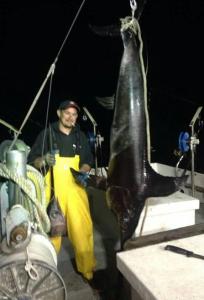Shawn Goulart

Young Fishermen in the Northeast United States
Interviews with 39 fishers between the ages of 18-35, located along the US East Coast from Maine to North Carolina. Collectively, they represent a wide variety of gear types and fisheries. All had been fishing full-time for at least two years and wanted to make fishing their career. They describe motivations for choosing a fishing career, strategies used, barriers encountered, and facilitating factors that have enabled interviewees to defy the graying trend to become successful fishermen.
Please visit the Voices SoundCloud page to explore clips and stories that relate to this collection.
Sarah Schumann
Shawn Goulart, 35 years old at the time of the interview, is a captain and deckhand based in Gloucester, MA. Shawn got into recreational fishing as a hobby in his early teens, and then quickly transitioned to commercial fishing, at a time when opportunities were plentiful in Gloucester. Since that time, he has seen the local groundfish fleet shrink, forcing him to spend months away each year fishing out of other East Coast ports to support his two young daughters.
Scope and Content Note
Shawn Goulart reflects on his fishing career and discusses the changes and challenges he has faced. Goulart notes significant shifts in Gloucester's fishing industry, particularly the decline in the groundfishing fleet and the rise in the lobster fleet due to regulatory measures like Amendment Thirteen. He says these changes have had negative consequences for the community, leading to financial hardships. Goulart highlights the uncertainties of his profession, the need to travel and be away from home, and the unfeasibility of owning his own boat due to financial constraints. Goulart emphasizes the importance of sustainability and responsible fishing practices, as well as the need for diversification in the fishing industry. He raises concerns about current fishing regulations, such as catch shares and quota management, which have made fishing more difficult and less profitable. Additionally, Goulart discusses the impact of these changes on the community of Gloucester, the challenges facing lobstering, the decline in young people entering the industry, and the decline in the number of active fishermen.
Recalling his first years, Shawn says, “At the time, there were probably two hundred or two hundred and fifty groundfish boats. Now, I think there might be twelve active groundfish boats that fish inshore, and maybe another eight or twelve that fish offshore.... [The regulations] have really done a good job of consolidating the fleet… Every boat in town here used to have big steel boats tied up to it. Now half of them are sporty boats…. It’s just hard. I’d like to be doing it as a captain, and I’m doing it as a deckhand, jumping from boat to boat. That’s the challenge of my life. Just recently, we had a scallop boat come in. Twenty-four hours before the scallop opening, the guy that I’d been working with for over a year turned around and said, ‘I’m sorry, but I can’t afford to pay you for the scalloping. I’m going to have to go by myself.’ I got two kids. It’s kind of hard to live life that way.”
Please Note: The oral histories in this collection are protected by copyright and have been created for educational, research and personal use as described by the Fair Use Doctrine in the U.S. Copyright law. Please reach out Voices@noaa.gov to let us know how these interviews are being used in your research, project, exhibit, etc. The Voices staff can help provide other useful resources related to your inquiry.
The NOAA mission is to understand and predict changes in climate, weather, oceans, and coasts, to share that knowledge and information with others, and to conserve and manage coastal and marine ecosystems and resources. The Voices Oral History Archives offers public access to a wide range of accounts, including historical materials that are products of their particular times, and may contain offensive language or negative stereotypes.
Voices Oral History Archives does not verify the accuracy of materials submitted to us. The opinions expressed in the interviews are those of the interviewee only. The interviews here have been made available to the public only after the interviewer has confirmed that they have obtained consent.
